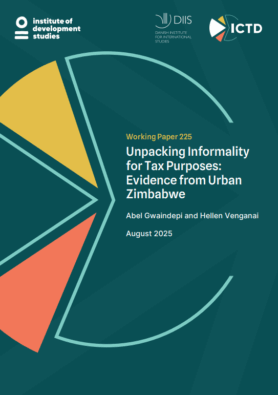Working Paper 225
Narratives about taxing the informal sector have led to unproductive top-down policies. They have not been underpinned by evidence on the distribution of earnings, local fees, licences, permits, and informal payments, which increase the cost of compliance and doing business.
Drawing on data from 2,490 urban informal operators in Harare and Masvingo in Zimbabwe, this study unpacks informality by examining the distribution of earnings, and the taxes, user fees, permits, and licences paid by informal sector operators. The findings reveal that only the top earnings quintile is potentially taxable. Quintiles 1 to 4 barely reach the poverty line using the lower poverty line threshold – even before factoring in taxes and licences. Women are concentrated in low-barrier, low-earning, informal economic activities. Despite only 6 per cent of the sample paying formal taxes under the national simplified tax regime (mainly presumptive taxes), other payments and associated compliance burdens increase the cost of doing business. As a result, bribes have become a pervasive informal payment, effectively collected by street-level officials. When informal operators fail to meet the requirements and cost of licences and permits, bribes often function as a catch-all payment – replacing official collection with unofficial arrangements that further undermine tax policies. Streamlining and reducing the number and value of licences and fees has the potential to improve the business environment, while encouraging formalisation in the long run.
These findings have important implications for research and policy, showing the need for tax policies that reflect the diverse realities of informal work. Informal activities range from those that are subsistence-level, to productive informal firms on the threshold of formalisation. They all require tailored policy responses that are sensitive to gender, sector, and city dynamics.
